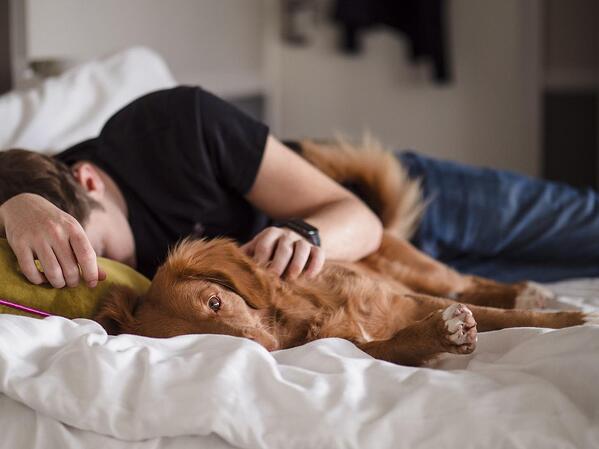
Pets can make you feel safe and happy. They can be your constant companion. They can be your exercise buddy just as much as your binge-watching couch potato partner. If you have a pet at home, we don’t have to tell you about all the wonderful benefits that come from having them in your life.
But, did you know that they can improve your sleep?
If you’ve ever looked at your cat and found yourself jealous of the 15+ hours of sleep they’re getting each day, we understand. You might not be able to lounge around as much as a cat or dog. But, your furry friend can improve your sleep habits and help you get a better night’s rest.
So, how can your pets improve your sleep? Let’s look at some routines you can start with them to get the shut-eye you need – so you’ll have more energy to throw the frisbee around tomorrow!
They Can Improve Your Mental Health
One of the biggest ways pets can improve your sleep is by helping your overall mental well-being. Dogs, in particular, can help with mental health conditions like depression and anxiety whether they’re in bed with you or not. Just having an animal around can greatly improve your mental health. Simply petting a dog can slow your heart rate and help you calm down if you’re experiencing a bout of anxiety. It’s no wonder why dogs are often used in the professional treatment of disorders like:
PTSD
OCD
GAD
When you’re less stressed and anxious, it becomes easier to sleep. Many people with anxiety struggle with racing thoughts, even through the night. That can cause a vicious cycle where you can’t sleep because you’re anxious, then you become more anxious because you can’t sleep. Sometimes, trying to relax makes things worse because your anxiety is all you think about.
If your pet helps to alleviate that anxiety, you won’t deal with as many nervous thoughts and you can get the sleep you need.
When your pet eases your mental health struggles, they’ll also benefit your body. A more relaxed mental state can help with things like:
Blood pressure
Insomnia
Cardiovascular issues
Speaking of heart health, studies have shown that sleeping with a dog promotes theta brainwaves, which occur during the REM cycle of sleep. That shows that you’re likely to get a deeper, more restful sleep when you share a bed with your pet. What’s even more interesting is that when dogs are with their owners, their heartbeats sync up. That just goes to show how important your pet’s presence can be on your brain and your sleep health. Imagine laying next to your four-legged friend and having the same heartbeat. How calming (and cute) is that?
They Can Wear You Out – in a Good Way!
It’s not just mental health your pet can help with. Dogs, especially, are built-in exercise buddies. Most dogs need between 30 minutes and two hours of physical activity each day, depending on the breed.
Getting that kind of exercise often requires you to jump in and get active, too. Whether it’s a jog through the neighborhood, a walk through the park, or a game of catch in the backyard, your dog will get you moving.
Physical activity is one of the best ways to ensure a better night’s sleep. When your body is tired and worn out, you’re more likely to fall asleep quickly and stay asleep through the night. This gives your muscles a chance to repair themselves so you can do it all again tomorrow.
So, while there’s nothing wrong with sitting on the couch watching your favorite show with your pet, make sure you’re getting some physical activity with them each day. It benefits them, but it will also benefit your sleep quality and your overall health!
As a bonus, there’s an old saying – “a tired dog is a good dog”. If your pet doesn’t get enough exercise each day, they might act out from restlessness or boredom. Unfortunately, that could include chewing on things or going through other destructive behaviors when you’re not home. If tiring your dog out is the only reason you start getting active with them, that’s a good enough reason. But, before long, you’ll start to notice some of the benefits for yourself.
The Benefits of Sleeping With Your Dog
Dog owners tend to be pretty split on whether or not their furry friend belongs in bed. If you do let your dog sleep with you, you’ve probably assumed the “pretzel position” on more than one occasion to give them enough space. Sleeping with a dog isn’t for everyone. You should ask yourself the following questions before deciding if it’s right for you:
Are you a light sleeper?
Do you startle easily?
Do you move around a lot in your sleep?
How committed are you?
Do you sleep with a partner?
If you do decide that sleeping with your dog is the right thing for your situation, you can take advantage of several additional benefits.
First, they can increase your sense of security. If you live alone, having your “guard dog” in bed with you can make you feel safer, so you’ll sleep more soundly. That doesn’t mean you have to have a German Sheperd or Rottweiler. Even small dogs can make you feel safe, simply because they’ll alert you to any unusual noises or movement (and their attitudes are often bigger than they are).
Sleeping with a dog also decreases loneliness. There’s a reason pet adoptions soared during the COVID-19 pandemic. People were facing long periods of isolation and loneliness, which can cause damage to mental health and make it harder to sleep. Loneliness can also cause people to experience more mental health issues like depression, and extra stress. A pet’s presence next to you in bed can ease those feelings. Sleeping with an animal strengthens your bond with them, and can help you both feel less lonely throughout the night.
If you feel like your dog’s top priority is to please you, you’re not wrong. Animals tend to pick up on our emotions and feelings. If you’re anxious or depressed, it can rub off on them. So, they want you to feel calm and happy, whether they realize how much they can actually help with that or not.
On top of the mental health benefits dogs and cats already provide, a sense of companionship is the icing on the cake. So, whether you’re struggling to get a good night’s sleep or you just want the comfort of your furry companion next to you, there are plenty of ways pets can improve your sleep and allow you to feel well-rested every morning.
Living the good life with your dog can be mutually beneficial. Try cozying up next to your dog for a week and determine if co-sleeping with your dog results in a more rested you.
Alaska Sleep Clinic’s Education Center had over 3 million visitors last year alone. We are proud to be the No.5 most visited sleep website in the world. Subscribe to our blog today and don’t miss out on all the latest information about the world of sleep.









